Group Size
?
1.) Small group (teams of 4-6)
2.) Individual Task
3.) Large Group
4.) Any
Small group (teams of 4-6), Individual Task, Large Group, Any
Learning Environment
?
1.) Lecture Theatre
2.) Presentation Space
3.) Carousel Tables (small working group)
4.) Any
5.) Outside
6.) Special
Any
QAA Enterprise Theme(s)
?
1.) Creativity and Innovation
2.) Opportunity recognition, creation and evaluation
3.) Decision making supported by critical analysis and judgement
4.) Implementation of ideas through leadership and management
5.) Reflection and Action
6.) Interpersonal Skills
7.) Communication and Strategy
1Creativity and Innovation
2Opportunity recognition‚ creation and evaluation
3Decision making supported by critical analysis and judgement
4Implementation of ideas through leadership and management
5Reflection and Action
6Interpersonal Skills
7Communication and Strategy
This case example can inform and enhance the ways in which providers of entrepreneurial education opportunities design and communicate those opportunities, to increase perceived value and relevance and increase uptake.
This case example presents a suite of summaries of eight entrepreneurial education activities which are offered within one or more undergraduate degree courses in the arts, humanities and sciences at Oxford Brookes University or the University of Birmingham, and provides student feedback on these summaries of these activities, with respect to relative appeal; perceived value; personal, disciplinary and career relevance; likelihood of uptake; and ways to strengthen the activities. Additional data on aspects of student attitudes to enterprise and entrepreneurship is provided for context. This case example can inform and enhance the ways in which providers of entrepreneurial education opportunities design and communicate those opportunities, to increase perceived value and relevance and increase uptake.
In-curricular course content, and in particular optional content, is frequently presented to student in a summary, snapshot form as part of the process of recruiting students to modules. These short summaries may be the only information students receive or engage with regarding options within their courses, and can therefore form the key basis of their decision-making with regards to which educational opportunities to pursue.
Staff engaged in enterprise and entrepreneurship education can face particular challenges in designing and communicating presenting opportunities which are different to conventional disciplinary provision, which may involve activities and concepts which are unfamiliar to many students, and which may or may not speak to students’ interests, values and student and pre-professional identities.
This case study presents summaries of a range of entrepreneurial education opportunities which are offered within one or more undergraduate degree courses in the arts, humanities and sciences at Oxford Brookes University or the University of Birmingham, and provides student feedback on these summaries, with respect to the aspects such as the relative appeal, perceived value, and disciplinary relevance of the educational opportunity, and likelihood of uptake.
The student feedback was gathered as part of the Enterprise Educators EUK Research Project ‘Increasing Engagement with Enterprise Education in the Arts, Humanities and Sciences’ (2022).
If you use this resource, the authors would greatly appreciate it if you could get in touch to outline the use and impact, to support impact tracking. Please email Dr. Andrea Macrae at andrea.macrae@brookes.ac.uk if so. Thank you.
Four examples of in-curricular entrepreneurial education activities were presented in the student focus groups (n=13). Students were asked to give feedback on what they perceived to be more and less appealing about each activity. Students were also asked to comment on the ways in which each activity was presented, e.g., the ways in which aspects of the activity were selectively foregrounded, the level of detail, etc. They were asked to suggest any ways in which the design and presentation of the activity could be improved to appeal to more students.
The full focus group transcripts can be found within the project’s published dataset, at doi.org/10.24384/epye-sj79. The full reference for this dataset is: Macrae, A., Hook, H. and Scrob, M. (2022). Increasing Engagement with Enterprise Education in the Arts, Humanities and Sciences EEUK Research Project Dataset [Data set]. RADAR, Oxford Brookes University. Available at: doi.org/10.24384/epye-sj79
The feedback is presented in narrative form, with individual speakers identified, so that readers can refer to the full transcripts and relate these comments to the broader picture of particular speakers’ experiences, identities and attitudes with respect to EntEd as revealed in the full transcripts.
Within the feedback, OBU refers to Oxford Brookes University and UOB refers to the University of Birmingham.
1. Entrepreneurial Start-Up model [for feedback on a similar activity design, see activity 6 in part 2, below]
All stages of the business cycle are covered:
“Four clear priorities for Birmingham and its citizens” (Birmingham City Council):
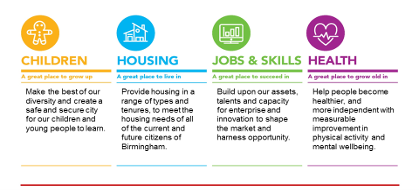
Credit: This module was co-designed between Dr. Mircea Scrob (Liberal Arts and Natural Sciences, University of Birmingham), Helen Hook (Careers Network, , University of Birmingham) and various industry partners. The problem statements were provided by Mr Raj Mack, Head of Digital City and Innovation for Digital Birmingham.
OBU focus group 1
Sam found the Entrepreneurial Start-up offering to be the least appealing option because they had no interest in starting their own business.
Sunan ranked the Entrepreneurial Start-up offering as the most preferred option as it provided transferrable skills (web design, training on pitch deck) that were relevant beyond starting one’s own business and for the world of work more generally. Sunan commented positively on the framing of the offering as well – clear bullet-points about what is to be gained on the module and the skills being offered.
Phoebe ranked the Entrepreneurial Start-up offering as their most preferred option, commenting positively on the transferrable skills and the mock job interview.
OBU focus group 2
Pete found the Entrepreneurial Start-up offering to be the most appealing. However, Pete mentioned also key aspects of running a business that seemed to be missing from the blurb and which would need to be covered. Pete felt strongly that it was important to be clear about the risks that come with business development and provide suitable training on what to do when things go wrong (i.e., problem-solving).
Simon found the Entrepreneurial Start-up offering to be the most appealing and mentioned in particular the opportunities to work in a group and pitch a business idea. Simon raised concerns about undertaking the module with insufficient background knowledge but, generally, Simon felt the module was a good addition to the C.V. because it enabled one to tackle a relevant social issue.
UoB Focus group 3
Victor found particularly appealing the pitching of a business idea as an alternative form of assessment to the essay format.
Alex evaluated positively the focus on finance and costings and considered it important that the module goes beyond theoretical discussions to give students the skills and possibilities to go forward and develop their own business. Finality was important here as well and needed to go beyond the academic setting.
Alex further suggested having a two-part module in which the first part was more based in theory and the second was focused on turning an idea into an actual business, with students able to join the second part directly by being given a business idea that they can implement.
Alex also recommended a clearer distinction between social entrepreneurship and “financial based” entrepreneurship as two offerings may appeal to different students. Alex also suggested that funding could be brought in, that students could be offered, as part of the module, training and the opportunity to apply for grants to finance their business idea, or that investors could be co-opted for reviewing for possible investment the most promising ideas.
Alex also suggested that the content of the modules should be tailored to specific disciplines as the requirements and process may be different for developing a product/service in one or another discipline.
For marketing purposes, Alex suggested moving beyond the list of skills of team work, leadership, ideation, and group work because by their final year students would have a good grounding in these skills and, therefore, these would be less of a selling point for the offering.
Bob referred to the importance of diversifying the range of partners/projects on the module, possibly involving charity and non-profit sectors. [This was picked up by Alex in relation to the distinctions between social and business entrepreneurship.]
Rosie recommended bringing in entrepreneurs/investors to give talks and guide students through the process. Mentoring the groups was perceived as very helpful as well. [This was mentioned in relation to a prompt from the facilitator regarding co-delivery of teaching by academics and externals.] Rosie found weekly guest speakers to be a very interesting prospect.
UoB Focus group 4
Ella gave a very positive appreciation of the offering, suggesting that it was an excellent opportunity to learn new skills and ways of thinking. Ella made two suggestions for improving the educational offering: 1) students should be able to self-select into groups as this would more closely mimic real-world situations in which people would opt in into a group/working environment, and this will make students more invested into the project and will help ease stress and 2) contextualise the case studies/problem statements within the disciplines of students, which helps also with showcasing the diversity and applicability of the subject-matter.
Ella returned to the issue of choosing one’s group in the answer to the Consultancy model – sector/industry projects - Professional Research Skills module project activity, making the point that this would allow one to leverage the various skills that people could be bringing to the team. The team could thus be assembled based on the needs of the project.
Adam gave a largely positive appreciation of the offering, identifying the assessments, in particular, as being different and well-chosen in their closeness to practice in the real world. Adam would not take the module themselves, though, as they felt they were insufficiently prepared when it came to the digital marketing and design element of the module and was worried about how that might impact their grades and degree results. Overall, Adam predicted that saw anyone with a sufficient foundational understanding of the key elements involved would definitely be interested in the module.
UoB Focus group 5
Lea started by questioning whether the module was relevant to their degree as it felt a little too science-focused, and recommending adapting the module to each discipline to maximise its relevance. Lea acknowledged the value of the module for potential graduate careers, though, emphasising that it gave students a good example through which to show future employers that they know how to expand a business and what it takes to run one.
Amal gave a very positive evaluation of the option and confirmed that they had experience with similar activities before. Amal suggested that this module could be made available in the First Year, believing that first year students are more able and willing to engage with different ways of thinking and learning in comparison to third year students.
2. Consultancy model – sector/industry projects - Professional Research Skills module project
Activity:
West Midlands Police Positive Action Coordinator:
"How do we re-brand WMP and our positive action team to make it more appealing to our BAME communities and younger generation, as the current entry routes are most certainly more preferential to the younger applicant? This is to recruit 1000 more BAME officers for the West Midlands."
Students apply research skills along with creative problem-solving through design thinking methodology to conduct a piece of research and analyse data in a problem-orientated manner in order to provide innovative solutions.
Assessment:

Credit: This module was designed by Dr. Ruth Page (Department of English Language and Linguistics, University of Birmingham) supported by Helen Hook (Careers Network, University of Birmingham) and various industry partners. The problem statement was provided by Adeeb Redman (Positive Action Coordinator for West Midlands Police).
Student feedback:
OBU focus group 1
Sam found consultancy-type modules quite interesting because the focus of both of them (this activity and activity 3, the ‘Consultancy model – sector/industry projects - Global Enterprise Project’), and the focus on recruiting BAME candidates within this activity, fitted with their degree interests and personal interests. More generally, Sam found the concept of consulting someone on how to run a business to be appealing.
Sunan voiced concerns about this kind of module being purely hypothetical and, similar to other activities at the University, doing something just theoretically without clear impact.
Sunan felt that foregrounding the skills involved and what the students got out of the experience would make it more appealing.
OBU focus group 2
Pete found this kind of activity to be less appealing than the Entrepreneurial Start-up activity, but appreciated the skills of analysing data and doing research, which they felt could be transferred to a range of work situations.
UoB Focus group 3
Bob found this educational offering to be most appealing because it involved working on a real-life scenario with an external partner, as opposed to doing something hypothetical. As such, students have the opportunity to bring about real change. Bob noted that impact is not paramount, but knowing that you are working on a real-life situation is helpful.
UoB Focus group 4
Ella evaluated this offering very positively. Ella felt that collaboration with external partners – especially an important stakeholder such as the West Midlands police – with the project idea coming from them, was particularly appealing. The real-life problem was another important feature that Ella felt was appealing but Ella felt that stakeholder engagement with the final outputs, and a degree of impact, was important. Ella felt that the point that this is a real-life issue, with implications outside of the module, needs to be communicated clearly to students to increase engagement.
Ella found the activity very helpful for showing students their abilities to make things happen and the applicability of their knowledge beyond their degree.
Adam found the civic engagement aspect of the activity to be appealing, bringing one’s knowledge to bear on a meaningful initiative.
When prompted, Adam mentioned a drawback - that these kinds of activities can be more time-consuming and resource-intensive than a standard module. Committing to solving a real-world challenge can draw more and more efforts and the student can become invested in it beyond the requirements of the module, and research may be more challenging with such topics. Adam felt that this can add to significant demands on students which can be a strain given their other modules and commitments.
In response to a prompt about what the ideal enterprise learning opportunity would look like and how it would be communicated, Adam indicated that this educational offering was the closest of all three to what they would consider an ideal learning opportunity in enterprise education. Adam felt that the immersive aspect of it, along with the problem-solving aspect of it, collaboration with external stakeholders (e.g., charities, corporate organisations) and the possibility for real-world, practical impact were particularly appealing, in contrast to standard modules which relied on more conventional content and textbook-based learning.
UoB Focus group 5
Lea gave a highly positive evaluation of this offering. Lea felt that the employer report – getting feedback and input on your work from an external partner – was particularly appealing and added a real-world element to it not necessarily offered within conventional academic learning. Lea had already committed to engage with this type of offering, having signed up for a related module in their second year of study and having engaged with pro-bono societies who offered legal advice on real-life claims.
Lea indicated that care needs to be taken when using specialised terminology (e.g., Design Thinking) as this can be alienating.
Responding to a discussion by Amal for the important of having a suitable range of external partners, Lea argued that external stakeholders should be involved in marking and assessing the outputs as per this activity, but that this raises issues of adequate support and consistent guidance and feedback being available to the students. Lea recommended that standard practices in academia should be followed to mitigate these risks.
Further to a prompt by the facilitator about external partners offering different levels of support and whether this would be perceived by students as a risk, Lea mentioned that this is what happened in a previous situation and that this can happen. However, Lea very much emphasised the benefit of getting feedback from the external stakeholders on why an idea is good or how it can be improved, which they felt adds a different angle to the activity that the lecturers may not be able to provide.
Lea concluded by saying that aspects of this activity module are already familiar to [UOB] students, which should help engage students with it.
Amal found the structure of the activity to be familiar as they had previously taken a module with similar assessments. Amal gave a positive evaluation of the activity and found the collaboration with external stakeholders to be a strength. Amal felt that placing the module in the second year of studies was appropriate as students can draw on the disciplinary knowledge they have already acquired.
Amal suggested that one possible challenge with this kind of offering is having sufficiently diverse projects and external partners to support them.
3. Consultancy model – sector/industry projects - Global Enterprise Project with authentic assessment
Activity:

Assessment information [provided in detail for University of Birmingham focus groups only]
The white paper should mirror your presentation. Only point 7 is different.
1. Essentials (20%)
To provide a compelling yet balanced case for internationalization, highlighting hey pros and cons. This should include fact-based evidence including:
2. Market research / Route to market (20%)
To demonstrate an understanding of:
3. E-Commerce (20%)
To demonstrate an understanding of:
4. Language / Culture (20%)
To demonstrate an understanding of:
5. Financial awareness / documentation (5%)
To demonstrate an understanding of:
6. External support (5%)
To highlight:
7. Reflexive part (10%)
To reflect on:
Credit: This module was originally designed collaboratively between Marie-Beatrice Boucheny (Department of Modern Languages, University of Birmingham), Helen Hook (Careers Network, University of Birmingham) and Patrick McCarron (Business Development Manager, Department for International Trade). The authentic assessment example was designed by Patrick McCarron and his colleagues.
Student feedback:
OBU focus group 1
Sam [as per the feedback to the pervious activity 2] found consultancy-type modules quite interesting because the focus of both of them (this activity and activity 2, the ‘Consultancy model – sector/industry projects - Professional Research Skills module project’) fitted with their degree interests and personal interests. More generally, Sam found the concept of consulting someone on how to run a business to be appealing.
Sunan [as per the feedback to the pervious activity 2] voiced concerns about this kind of module being purely hypothetical and, similar to other activities at the University, doing something just theoretically without clear impact.
Sunan felt that foregrounding the skills involved and what the students got out of the experience would make it more appealing.
Phoebe liked this educational offering because it involved working with SMEs and Phoebe was keen to support such businesses.
OBU focus group 2
Pete [as per the feedback to the pervious activity 2] found this kind of activity to be less appealing than the Entrepreneurial Start-up activity, but appreciated the skills of analysing data and doing research, which they felt could be transferred to a range of work situations.
UoB Focus group 3
Alex felt that authentic assessments were most useful generally (i.e., by implication, in comparison to other EntEd offerings) – having assessments that reflect what one will be doing beyond university.
UoB Focus group 4
Ella found this education offering rather “intimidating” and could not see the direct applicability to their own subject. Ella also felt that this activity offered less freedom as, in comparison the activity 1, the Entrepreneurial Start-up module, you are not coming up with your own idea but rather working within the constraints set by the external partner/prompt. Ella felt that the focus is more on gathering facts and finding out the “best way to do things” rather than on coming up with an idea.
[Further to a prompt about what the ideal enterprise learning opportunity would look like and how it would be communicated] Ella elaborated further on her feelings about creativity and idea-generation by indicating that a combination of the first activity (the Entrepreneurial Start-up module) and second (Consultancy model – sector/industry projects - Professional Research Skills module project) presented opportunities would be best suited for them in that this could involve an external organisation presenting a real-world problem they are facing but then asking students to develop a solution to solve it, without too many constraints.
Adam found this educational offering very interesting because it matched their Economics study interests and experience well.
UoB Focus group 5
Lea was especially enthusiastic about this education offering, feeling that is was very relevant to their degree subject and that the real-world aspect of it and the grounding it had in a concrete situation helped with acquiring relevant skills and gaining experience such as drafting contracts and developing a commercial awareness which was important after graduation. Lea noted that the activity covered skills and activities not practiced in the degree – market research as opposed to standard academic research. Lea felt that this type of activity is something that could be talked about in an interview and could make the degree more “meaningful” after graduation.
In response to a further prompt relating to the possible subjectivity with marking authentic assessments, Lea agreed with Amal (below) that a lot more support would be needed with this kind of activity because of how different they are to standard modules and because of students being unfamiliar with some of the activities being required (e.g., market research). Lea proposed having this kind of offering in the final year because number of students taking each module is lower than in previous years, which should help with providing the support required.
Amal had concerns about this particular offering, with an assessment carrying 75% which could impact their degree result (note individual assessments on Amal's course normally have a much smaller weighting). Overall, Amal raised the issue of how enterprise education may impact someone's degree outcome and that this was an issue that would be considered by students. Amal reflected that the (possible) subjectivity and inconsistency in marking (due to the outputs being so individual and student-driven) could be a deterrent. Amal stressed that gaining a certain degree classification/GPA is important and, therefore, the level of support offered to students will be important.
Activity:
Assessment: NGO Style Advocacy Briefing (2000 words) [related to subject discipline, embedded within module]
What are Advocacy Briefings?
A number of development NGOs (non-governmental organisations, usually non-profit, focused on a social, political or environmental issue) carry out advocacy work. Advocacy Briefings often have the direct aim of changing national and/or international policy or they can be more broadly concerned with raising awareness of an issue.
How do I write an Advocacy Briefing?
You should write your briefing with the general public as the intended audience. Hence, there is a need for clarity and an engaging presentation style (you may want to use images, diagrams, tables, boxes, etc.). However, to be credible it also needs to be research-based and you should therefore include references to academic literature in the same way as you would for any other piece of academic work. Your briefing should be analytical and not simply descriptive. It also needs to be persuasive but must acknowledge and engage with different perspectives or approaches to the issue you are looking at. Samples are available online.
Credit: This activity was developed by Dr. Stephen Hurt, Reader in International Relations, Oxford Brookes University, for use in a Politics module. What is shared here is a truncated version of the original assignment brief.
Student feedback:
OBU focus group 1
Fiona stressed the importance of working on a real-life situation – the company had to be genuinely interested in the problem it was proposing.
OBU focus group 2
Pete was not interested in this educational offering as it was felt to be hypothetical. Additionally, Pete felt that and it was not clear what would be achieved with the assessment at end, which Pete identified as an “essay” despite the articulation of the assessment as an advocacy briefing in the summary. Pete was not particularly keen on “writing another essay” as he felt he had enough of those.
Simon also interpreted the assessment as an essay despite the articulation of the assessment as an advocacy briefing in the summary, felt this assessment was not appealing and argued that it was not clear what would be gained from it.
Part 2: Feedback on entrepreneurial education activities from the student questionnaire
Four examples of in-curricular entrepreneurial education activities were presented in the student questionnaire (n=238), in summary snapshot form (partially reflecting the brevity with which module information must sometimes be communicated to students, and partially due to the constraints of the questionnaire format). Students were asked to rank the four activities in order of preference (1st = most appealing, 4th = least appealing) and were also asked to comment on their rationale for their choices of the most preferred and least preferred options. The information below summarises this data. The student feedback is valuable in revealing students’ priorities and concerns with respect to the design and framing of different entrepreneurship education opportunities. This enables providers to tailor provision, and presentation of provision, in ways which mitigate concerns, clarify aspects where common preconceptions may affect interpretation of the educational offer, and leverage aspects which are demonstrably more appealing. A small set of selected recommendations, to support this tailoring, is presented after the student feedback in each case.
Selected summary data is presented after the textual feedback, regarding:
These data provide useful context with which to interpret the feedback.
The complete student survey data can be found within the project’s published dataset, at doi.org/10.24384/epye-sj79. The full reference for this dataset is: Macrae, A., Hook, H. and Scrob, M. (2022). Increasing Engagement with Enterprise Education in the Arts, Humanities and Sciences EEUK Research Project Dataset [Data set]. RADAR, Oxford Brookes University. Available at: doi.org/10.24384/epye-sj79
Entrepreneurial education activities discussed in the student focus groups (snapshot summaries):
5. Use of authentic assessments within some modules: [most popular option overall]
Activity:
Modules use assessments which are directly relevant to the world of work, e.g., writing a blog post to communicate complex concepts, curating an exhibition, creating a strategy document, writing a policy white paper.
Student feedback:
Issues with the framing/nature of the assessment
Selected recommendations:
Activity:
Students work in groups to design a products/service, from ideation up to pitching to a panel of industry experts. The module covers all stages of business development, from creating a business concept, to customer discovery, financial optimization, digital marketing and prototyping. The assessed output is a Business Plan for the product/service.
Credit: This is based on activity 1 in part 1, which was co-designed between Dr. Mircea Scrob (Liberal Arts and Natural Sciences), Helen Hook (Careers Network, UOB) and various industry partners, including Mr Raj Mack, Head of Digital City and Innovation for Digital Birmingham, though this version de-emphasises the digital element.
Student feedback:
Activity:
Students work in groups on a sustainability challenge situated within the local context. The module covers researching a sustainability issue in a local context, considering key stakeholders, and evaluating existing initiatives. The assessed output is a Proposal for a new development or initiative to address this challenge, directed towards relevant stakeholders.
Student feedback:
Activity:
Students work in groups and in collaboration with external stakeholders on a challenge set by a community organisation. The module covers principles of civic engagement and leadership, researching a social issue, evaluating existing provision, and designing recommendations. The assessed output is a Policy Brief to be submitted to the community organisation.
Student feedback:
The impact of this case example is chiefly on entrepreneurship education providers, enabling evidence-informed design and tailoring of entrepreneurial education activities to increase student engagement and perceived relevance and value.
Chart 1. Students’ self-perceived prior university experience of enterprise and entrepreneurship.
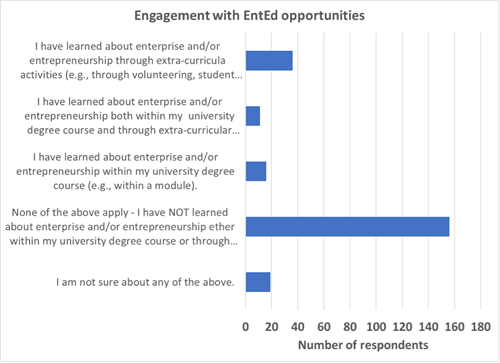
Chart 2a, 2b and 2c. Which enterprise and entrepreneurship competencies (using those identified in Bacigalupo et al 2016) are valued more and less by students?
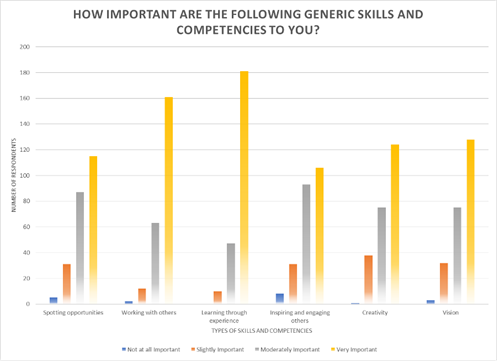
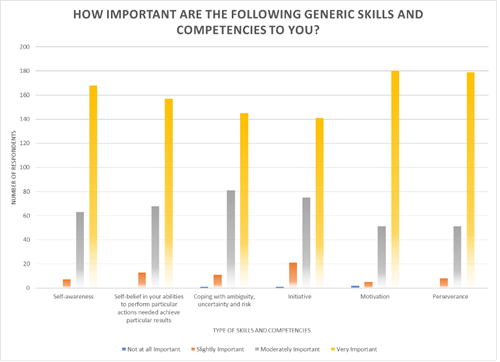
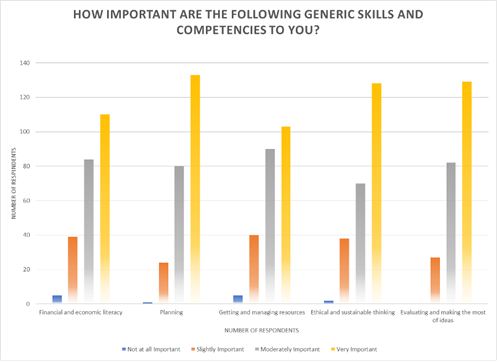
Chart 3. How far do students feel the enterprise and entrepreneurship are relevant to themselves and to their degree course?
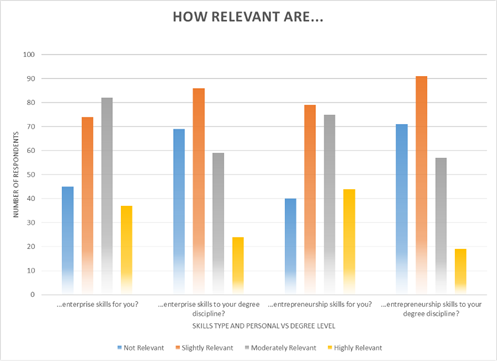
Chart 4. The rankings of the four enterprise and entrepreneurship activities.
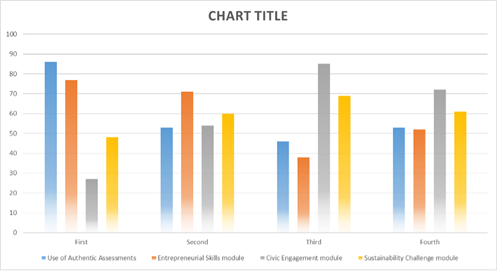
Bacigalupo, M., Kampylis, P., Punie, Y. and Van den Brande, G. (2016). ‘EntreComp: The Entrepreneurship Competence Framework’. Luxembourg: Publication Office of the European Union. Available at: europa.eu/!rq73WN
Department for Business, Innovation and Skills (2013). Enterprise Education Impact in Higher Education and Further Education: Final Report. Available at:
https://assets.publishing.service.gov.uk/government/uploads/system/uploads/attachment_data/file/208715/bis-13-904-enterprise-education-impact-in-higher-education-and-further-education.pdf
Macrae, A., Hook, H. and Scrob, M. (2022). Increasing Engagement with Enterprise Education in the Arts, Humanities and Sciences EEUK Research Project Dataset [Data set]. RADAR, Oxford Brookes University. Available at: doi.org/10.24384/epye-sj79